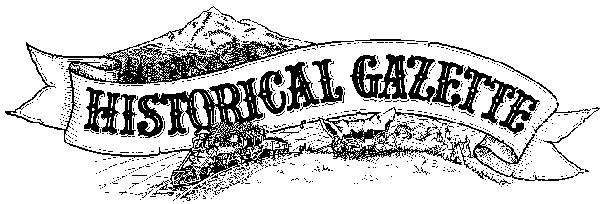Emigrant Wagons Roll Westward
Volume Two Number One
Oregon Trail 1843
Across the Plains in 1843
Arthur's Prairie First Furrow Plowed in Clackamas County When in 1843 the frontier fever assumed an epidemic form on a small scale in Missouri, my parents determined to cross the desert plains to the far distant territory of Oregon. Such a journey in those days was no child's play, performed as it was with ox teams, plodding through the dust and heat, climbing mountains and swimming rivers, and not knowing one minute what the next would bring forth.
It was men of the character and disposition to face such dangers accompanied by their heroic wives, mothers and sisters, who severed all connecting them with home and civilization and struck out boldly upon a trackless desert, known to be inhabited by howling wolves and merciless savages, surrounded by dangers, seen and unseen, who I undertake to say, were the chief event to save Oregon to the United States. Hence, I was a pioneer from necessity and in fact, and have ever looked at it without romantic coloring, but as a stern reality to fulfill a duty or destiny.
The early pioneers were forced to live mosly on bread and boiled wheat and drink pea coffee. They lived in log cabins, slept on blankets wore moccasins and buckskin pants, and endured many trials and difficulties.
I drove the foremost team down from the summit of the Blue Mountains that ever made a track on Umatilla soil and plowed the first 40 acres of land, if not the first furrow ever plowed in Clackamas County, the winter of 43, seven miles East of Oregon City, for my father, in what has been called the "Arthur Prairie" ever since that date, and lived in Oregon three long and doubtful years before the question of title to Oregon was settled between Great Britain and the United States, June 15, 1846.
I have lived under the provisional government, then the territorial government and have remained in the Willamette valley ever since Oregon was admitted into the sisterhood of states. I hold that I fulfilled my allotted part in the development of the natural resources of the country: but my labor has passed into the hands of others.
The lonely hut of the savage is gone and in its place are stately temples; the ravenous beast has fled from the face of man, and the valleys are all golden with ripening grain that awaits the harvester.
The beautiful Willamette runs onward to the Columbia as it did in the days of yore; the broad Columbia rolls its everlasting tide into the Pacific as it did when Bryant sang its praises to the world, but the light canoe is replaced by the mammoth steamship, and the shriek of the locomotive hourly wakes the sleeping echoes of its pine-fringed shores. David Arthur, Sunday Oregonian, 1889
"No other race of men with the means at their command would undertake so great a journey, none save these could successfully perform it, with no previous preparation, relying only on the fertility of their own invention to devise the means to overcome each danger and difficulty as it arose. They have undertaken to perform with slow-moving oxen a journey of two thousand miles. The way lies over trackless wastes, wide and deep rivers, ragged and lofty mountains and is beset with hostile savages." Jesse Applegate, 1843
The above story is one of several from this edition; in the printed version we have a story about Marcus Whitman's wild trip to the East from Oregon, and the close provisional government vote.
Continue the Oregon Trail saga! Read our Number Two of the series, Oregon Trail 1849 Gold Seekers Rush to California.

Bridget E. Smith, editor & publisher
Email | Home Page | Historic Headlines
Historical Gazette
Published in Portland, Oregon
© 1991-


